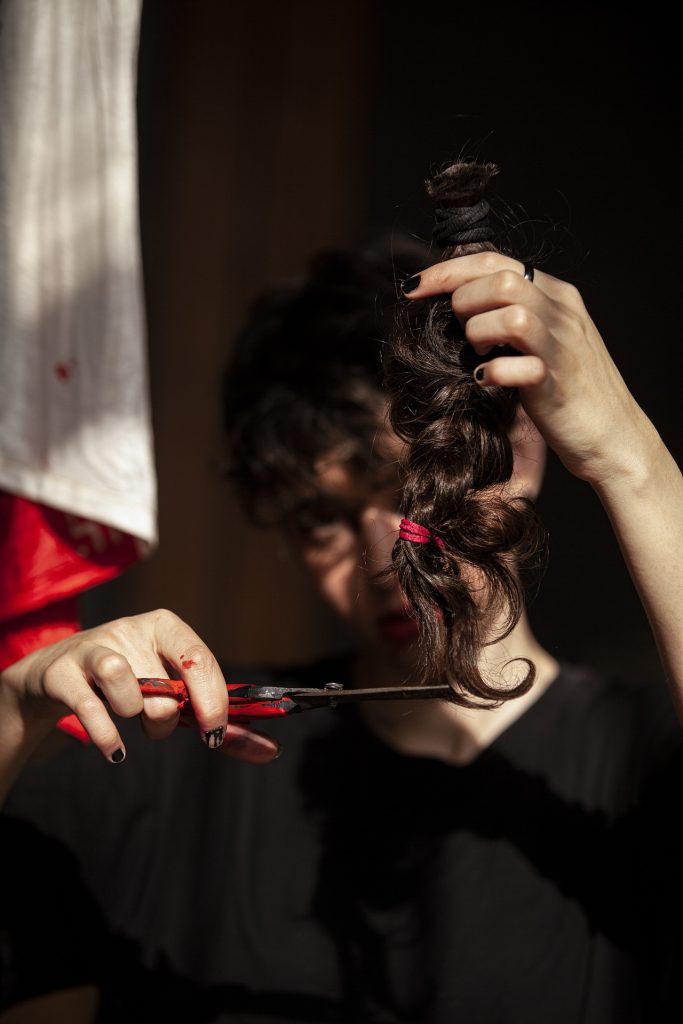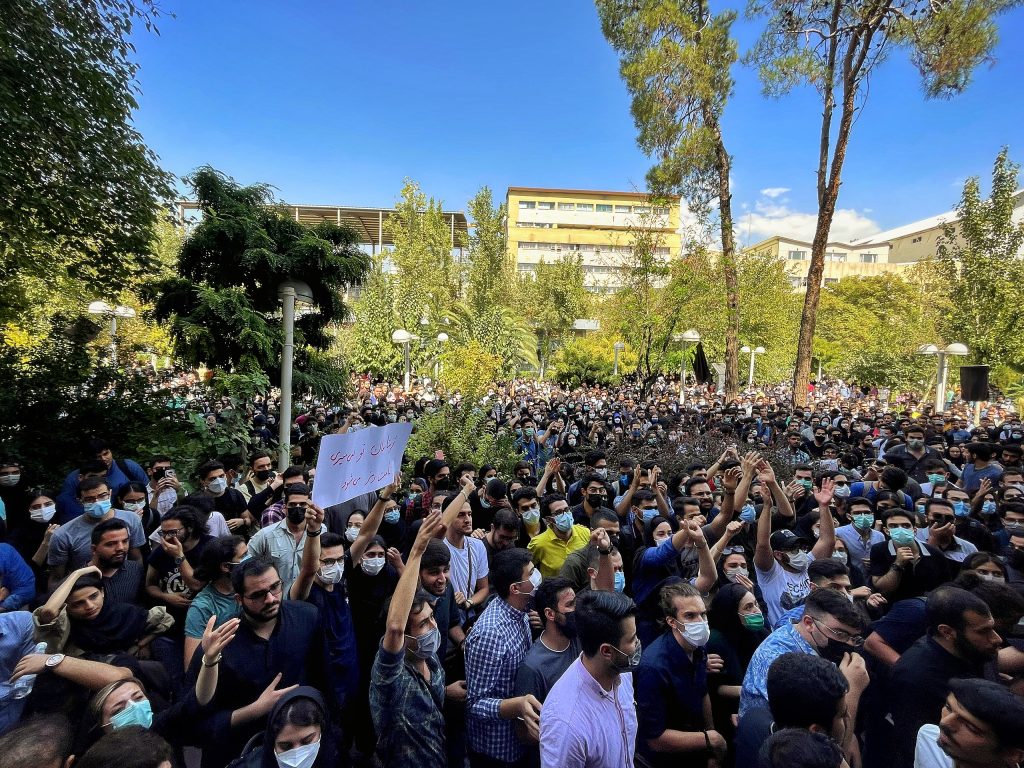14 Oct 2022 | Opinion, Ruth's blog

Photo: Shima Abedinzade
I went on my first political demo when I was a baby – joining the march against pit closures. For four decades I have been on demos to save jobs; on pickets to support striking workers and; on marches against racism and political extremism. I have participated in political stunts at elections and vigils to mark horrendous and heartbreaking events. Each has been newsworthy to some extent, each was meant to be a mark of solidarity with a community or a group whose voice needed to be amplified in order to be heard. Each was a statement of my personal values and a commitment to make our society a little better.
But none of these acts of democratic participation required me to be brave. Not really. I never once considered if my political views could, on that day, cost me my life. Although in hindsight some of them made me very vulnerable. But I never thought about it seriously because I am so incredibly lucky to live in a democracy, to have basic human rights which protect my right to be heard, to protest, to assemble. To speak truth to power. My biggest threats came from individuals who wished me harm – not a government or a police force or a judiciary.
I am lucky. I know I am. And I am so grateful for it.
Which is why it is so important that people like me, like you, use their voices to promote those who are brave, those who risk everything by walking down the street without a head scarf, those who stage a sit in outside the Kremlin against an unjust war, those who unveil a banner exposing the tyrant that governs them. These people are brave beyond words. They use the only things available to them – usually their bodies – to challenge an unacceptable status quo. And by doing so they build a movement. They move the dial just a little and they place untold pressure on the tyrants and dictators who strive to silence them.
We have a duty to support them, to tell their stories and to amplify their voices. Because otherwise nothing changes.
The tyrants win if we let these acts of protest pass without notice. If we let global news move on and forget the faces of those who have paid the ultimate sacrifice to demand their access to the universal values that we hold so dear and so easily take for granted. We have an obligation to support the Iranian women in their demands for equality. We have a duty to tell the stories of those Russian dissidents who push back against Putin’s illegal invasion. We have a responsibility to ensure that the democracy campaigners imprisoned in Hong Kong are remembered. Not just today but every day.
We have to be, today and always, a Voice for the Persecuted.
11 Oct 2022 | Iran, News
The death in custody of 22-year-old Mahsa Amini in Iran following her arrest by the “morality police” has sparked widespread protests across the country, with women taking a prominent role in demonstrating against their unequal treatment in the country. The Iranian regime, led by Ayatollah Khamenei, has responded with deadly violence.
Since Amini’s death on 16 September, precipitated by her arrest for not wearing the hijab correctly, at least 185 people, including at least 19 children, have been killed in the nationwide protests across Iran, according to the Center for Human Rights in Iran (CHRI). The deaths of several young women involved in the protests has led to a growing chorus of outrage, both within the country and internationally.
Among the dead is Sarina Esmailzadeh, a 16-year-old girl who was killed following protests on 22 September in Mehrshahr, just outside Tehran, reportedly due to repeated baton blows by security forces. Authorities have aired “so-called” confessions by alleged family members stating that her death was suicide, which have been called into question.
 Nika Shakarami (right) has also died, allegedly at the hands of the Iranian security forces, after she was pictured burning her hijab. The 17-year-old disappeared for nine days before her badly beaten body was identified by her family in a morgue.
Nika Shakarami (right) has also died, allegedly at the hands of the Iranian security forces, after she was pictured burning her hijab. The 17-year-old disappeared for nine days before her badly beaten body was identified by her family in a morgue.
Women human rights defenders and journalists are being targeted. Femena reports that women’s rights activist Narges Hosseini, one of the “Girls of Revolution Street”, who protested back in 2017 and 2018 about the compulsory hijab, was arrested on 22 September in Kashan in central Iran. Four years ago, she spent three months in prison on charges of “encouraging prostitution” and “non-observance of hijab”.
CHRI has also reported on the arrest of Niloufar Hamedi, a well-known journalist who first revealed the circumstances surrounding Mahsa Amini’s death that same say. Hamedi has been placed in solitary confinement in the notorious Evin prison.
Others who have been detained include journalist and woman human rights defender, Elaheh Mohammadi, Kurdish writer and filmmaker Mozhgan Kavusi and photojournalist Yalda Moayeri, according to Femena.
Golrokh Ebrahimi Iraeei, an Index contributor who was only released from prison in May 2022 after being imprisoned in 2014 on charges of insulting the Supreme Leader and spreading propaganda against the state, has also been rearrested.
The attacks and arrests have so far not managed to silence women, who continue to protest. According to the BBC World Service’s Rana Rahimpour women are walking the streets of Tehran with no hijab and cars are honking their support. School girls have also joined the protests. Social media posts that have gone viral show them going without a hijab and making rude gestures to and removing and covering the images of Supreme Leader Ayatollah Khamenei in their classrooms.
On 9 October, teenage girls in the city of Arak, southwest of capital Tehran, marched in protest chanting “death to the dictator”, before they were fired on with rubber bullets and tear gas by riot police.
Protests have also sprung up at universities across the country. Shots were fired indiscriminately by security forces at a protest at Tehran’s Sharif University on 8 October, according to CHRI. Students at the city’s University of Art held a demonstration on 10 October where they congregated to spell out the word “blood”. The same day, female students at the Polytechnic University chanted, “Tell my mother she no longer has a daughter” – a shocking reference to the fate that could befall the students for daring to protest.

Students of Amir Kabir university protest against the hijab. Photo: Darafsh Kaviyani
There are signs that support for the protests is spreading more widely. Oil workers in Iran, including port workers in Asaluyeh and refinery workers in Abadan, are striking in support of the protests. This could be significant as such protests have not been seen since the 1979 revolution.
The city of Sanandaj in Kurdistan has become the frontline of the protests and the regime has cracked down brutally, leading some to call the city a “war zone”. The CHRI reports that at least four people have been killed and more than 100 injured on 9 October. The government has deployed forces from outside the region in the city.
News that has emerged from Iran has made it out despite widespread internet and mobile network shutdowns in the country. NetBlocks has reported that the internet national mobile disruptions were in place once again and the internet had been cut in Sanandaj. Speaking to an Index correspondent over the phone from his home city of Sari in the north of Iran, the censored musician Mehdi Rajabian said: “It has become very difficult for me to access the free internet and the speeds of the platforms are very slow and blocked. I have to connect with a filter breaker and many times the filter breakers don’t work. Our communication is very slow.”
Such restrictions mean that the number of those killed, injured or detained is likely to be much higher.
There are signs that Iranians are increasingly looking to virtual private networks (VPNs) to help them circumvent the country’s internet broad censorship. Research by the VPN tracker Top10VPN.com shows that downloads of VPNs in Iran were 30 times higher at the end of September than in the previous 28 days and that demand for the services remains significantly heightened.
CHRI’s executive director Hadi Ghaemi feels that the situation is likely to worsen as Khamenei’s rule comes under growing pressure.
“The ruthless killings of civilians by security forces in Kurdistan Province, on the heels of the massacre in Baluchestan Province, are likely preludes to severe state violence to come,” said Ghaemi in a statement about the protests.
He said, “World leaders must move beyond statements of condemnation to collective action through an international front signalling to the government in Iran that the international community will not look the other way and conduct business as usual while it slaughters unarmed civilians.”
In response, Khamenei has said foreign states are responsible for driving the women’s protests. With support growing fast, he may soon no longer be able to lay the blame outside Iran’s borders.
30 Sep 2022 | Armenia, Azerbaijan, Burma, Hong Kong, Iran, Kyrgyzstan, Opinion, Ruth's blog, Saudi Arabia, United Kingdom, United States, Zimbabwe
The last week has been unprecedented in global news – although I do feel that every time we see the word unprecedented to refer to current events we’re just tempting fate to make it even worse. Our news has been dominated by crucially important and life-changing stories – the economic turmoil in the UK; the impact of global inflation; the real-life effects of Hurricanes Fiona and Ian on the east coast of Canada and the USA; Putin’s annexation of four more Ukrainian territories; the election of the most right-wing prime minister since Mussolini in Italy and; the suspected nation-state-orchestrated sabotage of the Nord Stream gas pipelines. This has been a busy news week. But beyond the headlines there have been so many other stories, other crises, other issues that in a ‘normal’ week (if there is such a thing anymore) would have demanded our attention.
So this week – I want to do a round-up of what we’ve missed as the world has become an even scarier place for too many people. To remind us all of what else is happening in the world that we’ve missed as we have been glued to the news that is struggling to report on everything that has happened.
- At least 18 journalists have been arrested in Iran for daring to cover the protests which have followed the brutal death of Mehsa Amina, who was beaten by state officials for incorrectly wearing a hijab.
- Prince Mohammed Bin Salman was appointed the Prime Minister of Saudi Arabia by his father, a move seemingly designed to give him an extra layer of legal protection in the ongoing lawsuits relating to the murder of Jamal Khashoggi.
- In an act of extraordinary self-sabotage which will undermine not only the British government’s global soft influence but will also significantly impact the promotion of real news and a free and fair media, the BBC World Service has announced deep cuts to their provision including ending Hindi, Arabic, Persian and Chinese radio services among others.
- Azerbaijan has launched an offensive into Armenia this month, with casualties reported on both sides. Although there is currently a ceasefire, the situation in Armenia looks bleak, with little international attention.
- Border clashes between Kyrgyzstan and Tajikistan have taken nearly 100 lives, with 137,000 people forced to flee the fighting in a week that has marked the worst violence in the area for years.
- The former democratic leader of Myanmar, Aung San Suu Kyi, has had a further three years added to her detention in a closed trial – her total sentence is now 23 years. In addition one of her advisors, the Australian citizen Sean Turnell, has also been sentenced to a three-year prison sentence by the military junta.
- In Zimbabwe, author Tsitsi Dangarembga has been arrested and fined for protesting against the government in the latest sign of a government crackdown against dissent.
- In Hong Kong, a man who attended the British Consulate in order to mark the passing of her Majesty Queen Elizabeth II has been arrested and charged with sedition for playing the British national anthem on his harmonica.
- A new report from Global Witness has highlighted the fact that an environmental activist is killed every two days while trying to prevent or expose aggressive forms of industry.
- In numerous states in the USA the impact of the end of Roe v Wade is now being felt. The University of Idaho has issued guidance informing faculty that they must remain neutral on issues relating to abortion or face dismissal – the rights afforded under academic freedom will not extend to this area.
- In the UK the Court of Appeal considered the case of the Colston 4 and the toppling of the statue of Edward Colston in Bristol. The judgement is far from ideal – and removes the human rights defence for future similar acts.
These are just a few of the dozens of stories that many of us missed this week while the world is in turmoil. As ever the role of Index is to make sure that these stories and those of dissidents are not ignored or forgotten.
22 Sep 2022 | Iran, News
 Iranians are again finding it impossible to access the internet and social media messaging platforms after yet another shutdown by the country’s authorities. The move comes after protests erupted in the country, sparked by the death of 22-year-old Mahsa Amini (right) last Friday.
Iranians are again finding it impossible to access the internet and social media messaging platforms after yet another shutdown by the country’s authorities. The move comes after protests erupted in the country, sparked by the death of 22-year-old Mahsa Amini (right) last Friday.
Critics say the shutdown of services and the filtering of content is restricting freedom of expression and preventing peaceful protest. Access to news in Iran is strictly controlled by the government and for many Iranians, their only access to independent news sources is through digital platforms.
Amini, a Kurdish woman from Saggez in Iranian Kurdistan, was visiting relatives in Tehran on 13 September when she was arrested by the Gasht-e Ershad. These so-called “morality police” uphold respect for Islamic morals, including detaining women who they see as being improperly dressed, such as wearing revealing or tight-fitting clothing or not wearing the required hijab.
The morality police detained Amini as she and her brother were coming out of the city’s Haqqani metro station. Eyewitnesses said Amini was brutally assaulted by the agents inside their vehicle and then taken to a police station.
Two hours after her arrest, Amini went into a coma. She was then taken to Kasra Hospital where doctors said she had suffered a heart stroke and brain haemorrhage due to a fractured skull. She died on Friday, 16 September.
Ever since her death, protests have spread across the country, reaching more than 80 cities nationwide. In typical fashion, the authorities have responded by shutting down access to the internet in a bid to quell the protests.
Iran is one of the world’s biggest censors of the internet. The country has been concerned about the internet since the turn of the millennium and has been operating a sophisticated system of hardware and software-based content filtering ever since. A broad project now known as the National Information Network (NIN), and similar to China’s Great Firewall, was launched in 2005. It requires companies to use Iranian data centres and forces internet users to register using their social IDs and telephone numbers.
NIN was finally fully implemented in 2019 and that same year Iran’s Supreme Leader Ayatollah Ali Khamenei said of the internet, “During these past 40 years, and today as ever, the enemy’s propaganda and communication policy, as well as its most active programmes, have revolved around making people and even our officials and statesmen lose their hope in the future. False news, biased analysis, reversing facts, concealing the hopeful aspects, amplifying small problems and berating or denying great advantages, have been constantly on the agenda of thousands of audio-visual and internet-based media by the enemies of the Iranian people.”
The country also has a history of using internet shutdowns to crack down on dissent.
In 2019, protests broke out across the country when the Iranian government announced a 50 per cent increase in fuel prices and monthly rationing of petrol. More than 100 people died, according to reports. The government swiftly shut down the internet and mobile networks for several days.
In February 2021, at least ten fuel couriers in Sistan and Baluchistan province on the border with Pakistan were killed after a two-day stand-off triggered by the Islamic Revolutionary Guard Corps blocking the road to the city of Saravan. The killings triggered demonstrations, leading to further deaths, and the regime shut down the internet across several cities in the province.
The UN High Commissioner for Human Rights said at the time: “Blanket internet shutdowns violate the principles of necessity and proportionality applicable to restrictions of freedom of expression and constitute a violation of international human rights law.”
The protests around the death of Mahsa Amini have seen the Iranian authorities reach for the internet shutdown playbook once more.
NetBlocks and AccessNow report that internet access began to be disrupted in Tehran and other parts of the country on the day of Amini’s death and on Monday 19 September, internet access was shut down almost totally in parts of the Kurdistan province.
The KeepItOn coalition, of which AccessNow is a member, said that this represents Iran’s third internet shutdown in less than 12 months. They said the “repressive, knee-jerk response to recent protests seriously interferes with people’s right to freedom of expression and assembly”.
Iranians have increasingly resorted to using unfiltered channels to get their news, as the only parts of the internet that they can access are censored. By 2018, it was believed that more than half of Iran’s population were using Telegram. In April that year the judiciary banned the popular messaging app, claiming it has been used to organise attacks and street protests. Since then, Iranians have switched to WhatsApp and Instagram.
It comes as no surprise that with the current protests NetBlocks has reported that access to Instagram, one of the last remaining social media platforms in Iran, was restricted across all major internet providers on Wednesday 21 September.
The authorities appear to have clamped down because of the widespread nature of the protests and, perhaps more worryingly for the regime, a large number of video clips that have gone viral and which they are keen to suppress.
A peaceful protest in Saqqez
Not just the young
A clip of several men defending a woman who has removed her hijab
Another video clip shared on Twitter by British comedian Omid Djalili, whose parents are Iranian, suggested that, perhaps, attitudes may finally be changing in Iran.
Responding to the crackdown on protest and the internet shutdowns, experts from the UN Human Rights Council’s Special Procedures group said in a statement, “Disruptions to the internet are usually part of a larger effort to stifle the free expression and association of the Iranian population, and to curtail ongoing protests. State-mandated internet disruptions cannot be justified under any circumstances.”
“Over the past four decades, Iranian women have continued to peacefully protest against the compulsory hijab rules and the violations of their fundamental human rights,” the experts said. “Iran must repeal all legislation and policies that discriminate on the grounds of sex and gender, in line with international human rights standards.”
Speaking to Index, exiled Iranian film-maker Vahid Zarezdeh said the WhatsApp and Instagram ban means he has been cut off from his young son and the rest of his family still in the country.
He said, “In the absence of independent parties and free media, Iranian society gets its news and events, social and political issues from the internet. News reaches its audience very quickly and people can easily distinguish fake news from real news. How, you ask? The solution is very easy. By looking at the state television, you can understand which news is true and which is false. Whenever the government reacts sharply to news and prepares a report, it is very likely that the news is true, and when it ignores the news and is indifferent, it means that it is fake.”
State TV has been reporting on the protests but its coverage has focused less on the protests by women and instead suggesting that the unrest has been caused by Iran’s enemies, rather than spurred on by the regime’s crackdown. Certainly, TV viewers in the country have not seen the clips above.
“This is a system of repression and the Iranian regime does not care what the world community thinks about it and human rights,” said Zarezdeh.
He added, “It’s more than forty years since Iranian women started to be ignored by the Islamic regime. Now they have found the courage and belief to stand in front of the bullets with empty hands and without a scarf.


 Nika Shakarami (right) has also died
Nika Shakarami (right) has also died
 Iranians are again finding it impossible to access the internet and social media messaging platforms after yet another shutdown by the country’s authorities. The move comes after protests erupted in the country, sparked by the death of 22-year-old Mahsa Amini (right) last Friday.
Iranians are again finding it impossible to access the internet and social media messaging platforms after yet another shutdown by the country’s authorities. The move comes after protests erupted in the country, sparked by the death of 22-year-old Mahsa Amini (right) last Friday.